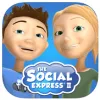Take a look inside 5 images
The Social Express II
Pros: Interactive lessons connect to the real world; extensive teacher tools support learning.
Cons: Subscriptions can be pricey.
Bottom Line: Compelling webisodes help students learn to cope with real-life situations.
Depending on your students, The Social Express II can be great for whole-class, small-group, or one-to-one instruction. Using a smartboard, you can show webisodes to your students and have them help characters make correct social choices. Have students role-play the given scenarios within each lesson to reinforce social concepts. Observe interactions in your classroom to identify particular areas of weakness, and choose webisodes that target those areas. As students become more involved with the lessons, you might even want to video or record students to help them evaluate their presentations. Have students discuss other social situations they may encounter in school, such as those in the locker room, the hallways, or recess.
The Social Express II is an animated app for boosting kids' social-awareness skills. Each lesson presents daily interactive social situations using video modeling, "hidden rules," and suggestions for how to solve problems in daily life. Beginner lessons encourage kids to explore nonverbal cues and stress the importance of eye contact. Intermediate and advanced lessons help kids transfer social rules into real life. Each level includes teacher tips to help teachers guide students in resolving the intended social lesson.
After setting up or selecting a profile, teachers or kids choose a beginner, an intermediate, or an advanced webisode. The fully animated lessons target many of the social skills kids encounter in their day-to-day lives. Kids help each character resolve social situations at locations around town including a café, a fire station, a music store, and a park. Every lesson offers the option to stop and replay. A companion website offers a wealth of guides and resources as well as student-tracking options.
Animated characters and real-life social situations capture kids' attention and offer them a natural way to understand and practice key social cues and skills that are needed for success in life. The app uses beautiful visuals and animation to present realistic day-to-day social scenarios. Each lesson offers kids the chance to make decisions about the choices the characters make -- and witness possible consequences of those choices. When it's time to make a choice, it's not always clear what the different options represent, so kids may just choose at random. Kids try again until they make the "best" choice.
Sometimes the action choices feel black-and-white and the resolutions lacking in nuance, and sometimes teachers may not agree that the "good" choice is really the best possible outcome. For these reasons, The Social Express II may not be a good resource for all kids. However, there's always a better choice in opposition to "not so good" choices, which puts things in very clear terms for kids who struggle with social situations. Repeating the lessons can help increase a child's social awareness. And kids' choices in the app can seed discussions about how to transfer these social skills to kids' personal lives. Printables allow kids to have a tangible reminder about coping strategies, feelings, and more; kids can carry these with them or post them on a wall.
Part of what makes the app shine is the guidance it gives teachers, from the teaching tips that appear during a lesson (which can be turned off for students using the app independently) to the comprehensive Curriculum section with lesson plans, assessments, printables, and more. The Clubhouse social network raises privacy concerns because kids can reveal personal information; it's optional, though, so teachers can simply choose not to allow students to participate.














